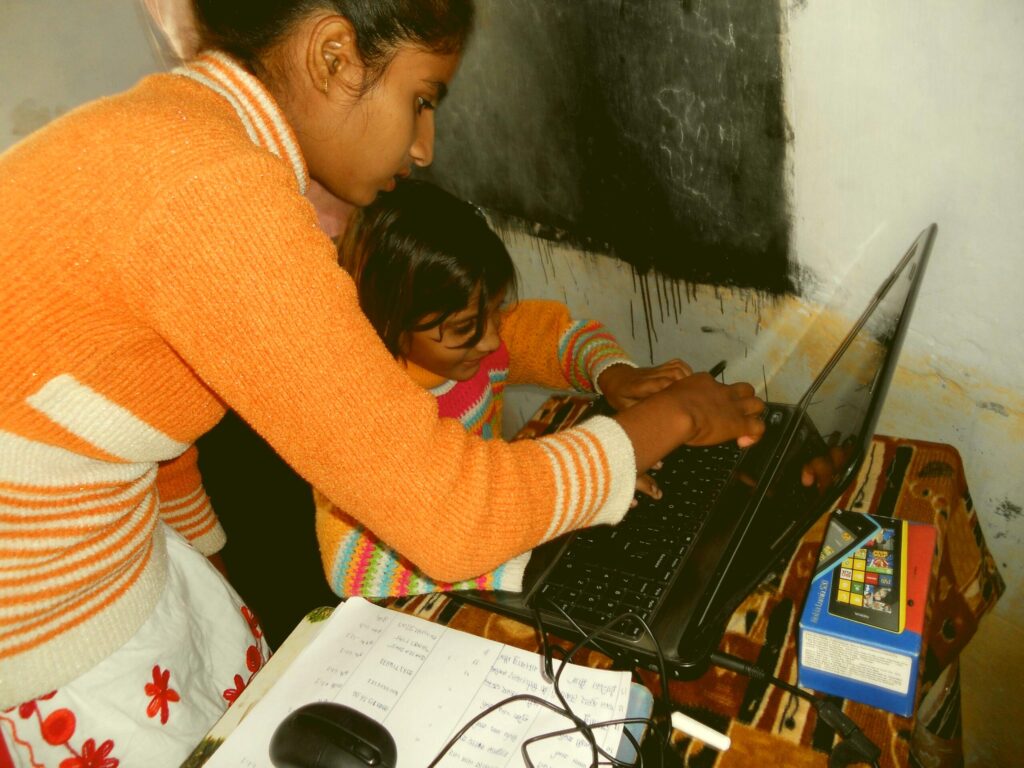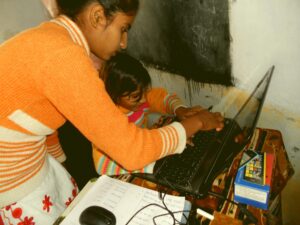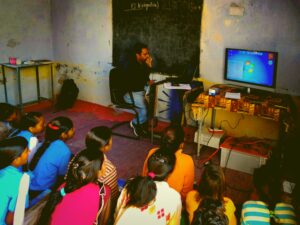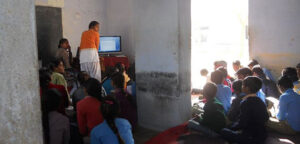Computer Education in Rural Areas and the Work of Paani Ki Bund Foundation

Everybody should learn to program a computer, because it teaches you how to think
Steve Jobs

The Importance of Computer Education in Rural Areas and the Work of Paani Ki Bund Foundation
In today’s fast-paced world, technology is advancing rapidly and transforming the way we live, work, and interact. However, despite this rapid development, many rural areas, especially in India, have yet to experience the benefits of this technological revolution. While urban centers thrive with access to cutting-edge technology, rural communities remain on the margins, where even basic computer education is often a distant dream.
For many people living in these areas, English is not the primary language. Instead, their daily lives are shaped by local languages and dialects. In such regions, understanding and utilizing technology becomes more challenging, as most technological platforms and educational resources are designed with English as the primary medium. The language barrier, coupled with limited access to computers and the internet, makes it difficult for rural communities to tap into the opportunities that technology can provide.
This is where organizations like Paani Ki Bund Foundation step in, working tirelessly to bridge the digital divide by providing valuable computer education to the underprivileged in rural areas of India. Their outreach efforts have already touched the lives of hundreds of children, empowering them with the skills they need to succeed in the modern world.

The Role of Computer Education in Rural Development
Computer education is no longer a luxury—it’s a necessity. As the world becomes increasingly digital, knowing how to use computers and access the internet is crucial for personal and professional growth. In rural areas, access to these skills can open the door to numerous opportunities, from better job prospects to improved education and access to vital resources.
For children and young people growing up in rural India, learning basic computer skills can be transformative. It allows them to connect with the broader world, access online educational content, and even engage with global markets and platforms. In a time when most industries and services are digitized, having computer literacy can mean the difference between staying trapped in the cycle of poverty or breaking out of it with better career prospects

Overcoming Language and Access Barriers
One of the biggest challenges in providing computer education in rural areas is the language barrier. Most software programs, educational materials, and even online resources are in English, making it difficult for non-English speakers to grasp the basics of computer usage.
Moreover, many rural schools and communities do not have access to computers or the internet, making it impossible for students to receive practical training. Even where computers are available, outdated technology and a lack of trained instructors further complicate the learning process.
Despite these challenges, the *Paani Ki Bund Foundation* is making significant strides in overcoming these obstacles. By creating localized computer education programs, they ensure that learning materials are available in the local language. Additionally, they provide hands-on training, enabling students to understand how to use computers and navigate the digital world.
The Work of Paani Ki Bund Foundation
The Paani Ki Bund Foundation has dedicated itself to the mission of bringing technical education to rural areas in India. Recognizing that technology is the key to breaking the cycle of poverty and underdevelopment, the foundation focuses on offering accessible computer education to children and young adults who would otherwise have no opportunity to learn these vital skills.
The foundation has developed innovative approaches to teaching computer literacy. By using a blend of local languages and visual learning techniques, they make it easier for rural students to grasp basic concepts like operating systems, word processing, and internet browsing. The practical, hands-on approach also ensures that students not only understand the theoretical aspects of computers but also develop the ability to use them independently.
In addition to teaching computer skills, Paani Ki Bund Foundation emphasizes the importance of internet safety and responsible usage. In an era where misinformation and digital threats are prevalent, educating young minds about the safe and ethical use of technology is essential. This holistic approach ensures that students are equipped not just with technical skills, but also with the knowledge to use these skills wisely.
The Impact of the Foundation’s Work
The outreach efforts of the Paani Ki Bund Foundation have already made a significant impact. Hundreds of children in various rural regions have gained access to computer education, which has helped them achieve their personal and academic goals. Many students, who once had no hope of advancing beyond basic schooling, are now pursuing higher education and professional careers thanks to the skills they acquired.
The foundation’s work is not just about imparting knowledge—it’s about empowering communities. By educating the youth, they are creating a generation of digitally literate individuals who can bring change to their communities. As more students learn to use technology, they are not only improving their own futures but also contributing to the economic and social development of their villages.
The Road Ahead
While Paani Ki Bund Foundation has made great strides, there is still much work to be done. India’s rural areas are vast, and millions of children still lack access to basic computer education. However, with continued support and commitment, the foundation hopes to expand its efforts, reaching even more communities and transforming lives through the power of technology.
In conclusion, computer education is critical to the development of rural India. It is a tool that can break down barriers, open doors to opportunity, and pave the way for a brighter future. The Paani Ki Bund Foundation is at the forefront of this movement, ensuring that rural children are not left behind in the digital age. Their work is not just about teaching computer skills—it’s about giving individuals the power to shape their own destinies.


Leave a Reply